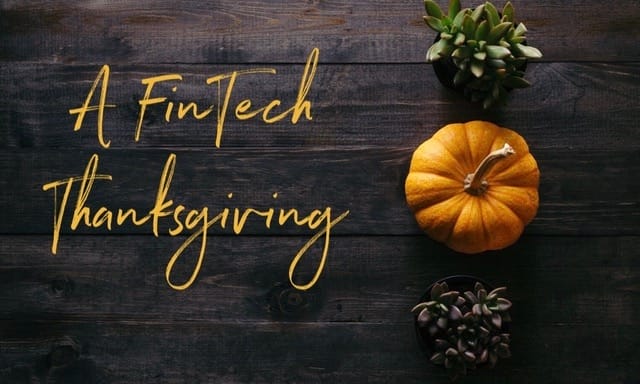By Theodora Lau and Bradley Leimer
The end of the year always seems to bring on moments of reflection, a time to think about the year just past, to be thankful for the gifts and experiences we have received, the lessons we have learned, and the memories and moments that inspire us to move forward.
A FinTech 2019 Thanksgiving – With Added Gravy
As the Thanksgiving holiday fast approaches us in the United States, and as similar festivals are celebrated around the world, it is time for us to reflect as well. As we gather with our fintech friends and families this week and throughout the holiday season, we deliberate upon the year that was 2019. These are some of the notable moments that will impact our thoughts and actions in the coming year. What were some of yours? Clink your glasses and gather round.
With still one month left to go before the end of the year, Charles Schwab announced a US$26 billion deal with TD Ameritrade – creating an online broking powerhouse with 24 million accounts and more than US$5 trillion client assets. It remains to be seen if it would face antitrust hurdle – and how the rest of the industry will respond. We expect to see more surprising mashups, of brands old and new, and of business models both discongruent and tangential. What couplings will surprise us in 2020 we wonder aloud?
From mega mergers to partnerships, the payments vertical has seen a flurry of activities. Paypal recently announced a US$4 billion deal to buy online shopping tool Honey. This follows mega deals announced between Worldpay and FIS, TSYS and Global Payments, Fiserv and First Data, and Wirecard and AllScore Payment Services. What is everyone of these companies seeking? Access to more and more data – as data has become the currency and lifeblood of big business – but to what end?
Elsewhere in the East, the mobile payment industry grows at a brisk pace, with China steadily marching towards a cashless society. Alipay and Tencent pay continue to gain ground, and 81% of smartphone users in China using proximity mobile payments. On Singles Day, Alibaba reported a record US$38.4 billion of sales, netting its first US$1 billion in sales in just 68 seconds and first US$10 billion in half an hour. Interesting, over 1 million orders were placed and processed through voice command. We can’t help wonder when (or if) we will eventually get to these levels in the West, with our unwavering love for plastic cards.
Is cash dead? We hope not for some time, as it disproportionately impacts people with less wealth and those already financially excluded. And why not also question the needless consumption boost and associated plastic and cardboard waste created by these spending events why were at it? Don’t get us started on that one (or better yet, just listen to this week’s podcast).
Speaking of plastic, another highlight this year is the launch of the Apple Card, the love child between two industry titans, Apple and Goldman Sachs. It was released with much fanfare – and although we were thoroughly impressed by the onboarding user experience, its real impact on Apple Pay adoption remains to be seen. We would love to see more features around helping consumers set/achieve financial goals – much like what they have been doing with the health rings. Is it too late to help people curb their debt as much as their waistline? The industry needs to step up indeed, as the optimization of day to day spending and appropriate use of credit is a long term benefit to everyone and every balance sheet involved.
Aside from Apple, big techs around the world have been dabbling in financial services this year. Softbank signed a US$30 billion deal between Yahoo Japan and Whatsapp rival, Line, with the goal of creating a Southeast Asia powerhouse in data and AI. Gojek, (the first decacorn company in Indonesia) and Grab continue to expand their services in their region, with Grab launching a host of financial services for Singapore, including micro-insurance and lending for SME, in addition to its mobile wallet GrabPay.
No wonder Uber is eager to borrow a playbook from these super apps, with the launch of Uber Money, in an effort to generate new revenue streams from its more than four million drivers and beyond. Will Europe ever bear a superapp child of their own? While we have our doubts, as competition likely won’t trump privacy, it would be good to see open banking flourish in the market where it had its genesis. Stay tuned.
In India, Paytm just raised US$1 billion, including US$400 million from Ant Financials and US$200 million from SoftBank Vision Fund. The company is now valued at US$16 billion, greater than any other local startup in India. The country might be turning into the newest payments battleground, as the digital payments market in India is estimated to be worth US$1 trillion in the next four years according to Credit Suisse. Other prominent global players there include Google, Walmark (Flipkart), and Facebook (Whatsapp). How much room will each competitor allow the other – and what role will regulations play? It’s the battle for the next decade.
Also noteworthy is Google’s premature partnership announcement with Citibank and Stanford Credit Union to offer checking accounts, which has caused quite a stir as we still do not seem to know much about what it entails. It will be interesting to see if consumers will finally push back against the tech giant – or not. Given their recent issues with Google employees seeking more transparency from their employer in several areas, one wonders if the tech industry itself will lead the revolution from within.
Last but not least, global challenger banks have raised over US$3 billion through early November 2019, according to CB Insights’ Global Fintech Report Q3 2019. Thanks to a new infusion of funding, Brazilian startup Nubank is now the largest digital bank in the world. We expect to see this trend continue. But even if neo-banks and challengers continue to grow across major markets, will it make an impact on the traditional banking model? We would argue that it already has, as revenue and customer value propositions have already shifted strategy at most big banks.
We hope this is a good thing for the industry, and a good thing for the march toward greater transparency and global financial optimization and inclusion. But are we truly moving the needle? Are we driving the right type of change? While we continue to see venture funding pouring in to many areas of fintech, especially for challenger models that claim to be revolutionizing the financial services industry, are we truly achieving inclusion?
How do we define purpose and build sustainable business models to better serve local communities and those forgotten demographics in our society? How do we create more value with data – and help consumers build a more secure financial future? As we have said before, our industry has so much more to do. Onward.
On this Thanksgiving holiday, and during this holiday season, as we are fortunate to enjoy another bountiful meal with holiday trimmings, let us take a moment to reflect on our own personal journey this past year, the things that matter most in our lives. Let this Thanksgiving be a day to give more than just thanks – let it be a time for us to give back to our society as well.
Be sure to tune in for this week’s new podcast episode via iTunes and Spotify – The FinTech Thanksgiving – with Arun, Bradley, and Theo talking about these topics and so much more.
Thank you for being part of our community. A truly Happy Thanksgiving to you all.
See more by the team here.
More about Irish Tech News
Irish Tech News are Ireland’s No. 1 Online Tech Publication and often Ireland’s No.1 Tech Podcast too.
You can find hundreds of fantastic previous episodes and subscribe using whatever platform you like via our Anchor.fm page here: https://anchor.fm/irish-tech-news
If you’d like to be featured in an upcoming Podcast email us at [email protected] now to discuss.
Irish Tech News have a range of services available to help promote your business. Why not drop us a line at [email protected] now to find out more about how we can help you reach our audience.
You can also find and follow us on Twitter, LinkedIn, Facebook, Instagram, TikTok and Snapchat.

